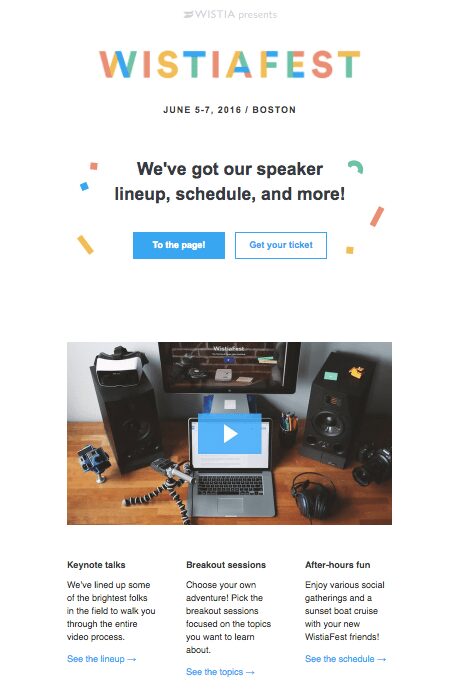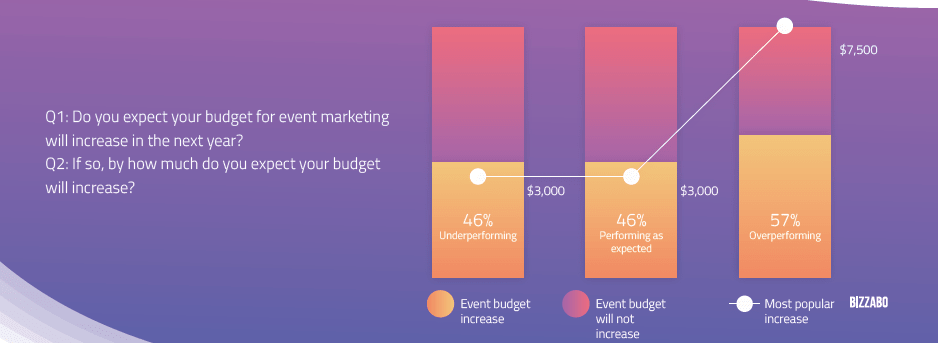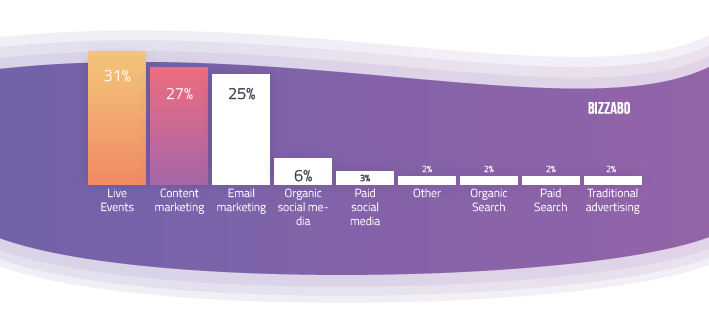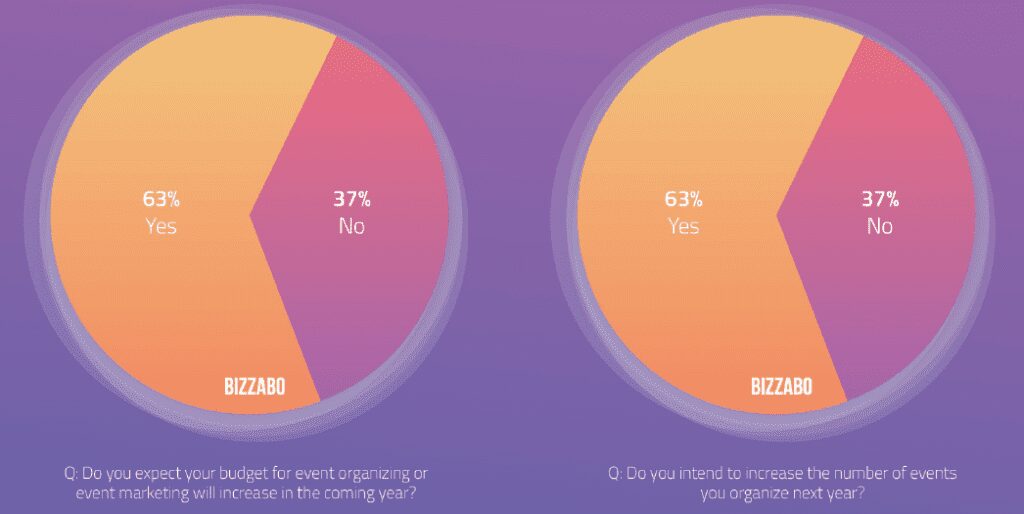What is the state of event marketing? Where is it going? These are the questions we set out to answer in a recent industry report. The resulting event marketing stats and findings were—for lack of a better turn of phrase—jaw-dropping.
We know that events are effective, we know that they’re popular and if you are reading this post, then there’s a good chance that you are a believer in the power of events, too. However, for much of the history of events it’s been difficult to judge just how effective and powerful events can be. The ability to track, attribute and analyze event ROI just wasn’t there before.
Without concrete numbers to back their strategies, event marketers were left with hunches and superficial statistics to justify their event strategies. This event generated X amount of revenue from registrations. X amount of people became customers at this event. Our logo got in front of X amount of eyes at this one.
While those metrics served a purpose, they failed to tell the full story of an event marketing campaign and in doing so created a fragmented picture of event success.
Then came along modern event technology.
Then everything changed more than anyone could have ever imagined.
The proof is in the data.
For the Event Marketing 2018 Benchmarks and Trends report, we surveyed over 400 mid- to senior-level marketers. We asked them questions about event marketing budgets, strategies, technologies, trends and more. The resulting findings, as you will soon see, paint a startling picture of where event marketing is and where it is going.
To help illustrate that picture, we’ve pulled 10 of the most significant stats from the Event Marketing 2018 report and explained how they spell out big, jaw-dropping changes for the future of events.
1) The majority of marketers (80%) believe live events are critical to their company’s success.
Events are no longer a nice to have. They are absolutely critical for outpacing and outlasting competitors. Every type of organization—from accounting firms to tech companies, to nonprofits, to publishers—now produce events. Take for instance BDO Australia, HubSpot, The American Heart Association and Forbes. All of these organizations believe events are critical to their company’s success and produce them because of it.
To paraphrase the mantra of the Instagram era: “Events or it didn’t happen.”
This belief in the power of events is made all the starker by the following…
2) Most marketers (31%) believe that event marketing is the single-most effective marketing channel.
In the 1960s and ‘70s, marketers businesses invested heavily in traditional advertising (print ads, billboards and tv ads) to generate awareness and ultimately gain customers. In the early ‘90s and the late ‘00s, businesses began establishing strong online footholds through email, websites and social media.
Today, marketers agree that, more than any other marketing channel, event marketing reigns supreme. And for a good reason…
3) 95% of marketers agree that live events provide attendees with a valuable opportunity to form in-person connections in an increasingly digital world.
The rise of digital ads in the early ‘90s and late ‘00s coincided with the widespread adoption of internet and social media platforms by consumers. Businesses invested heavily in the online world, but a response from consumers was inevitable.
Time and time again, consumers have expressed a reluctance to engage with brands digitally. Think about the last time you tried to watch a video on YouTube. Chances are you were eagerly awaiting the appearance of the “Skip This Ad” button. (If you’re a YouTube Red subscriber, you probably avoided seeing any ads altogether.)
In some cases, consumers can skip advertisements and in other cases they outright block them. But even when consumers are not consciously resisting brand engagement, advertisers have to fight tooth and claw with one another to be noticed.
Every minute 3.8 million Google searches are made, 1,440 blog posts are published and nearly 150,000 emails are sent.
If brands hope to engage with prospects, customers and partners in meaningful ways, they are going to need to make like Morpheus and step out of the online world and into the real one.
4) Most event marketers (40%) believe email marketing is the most effective channel for promoting an event.
While event marketing will continue to be a must for engaging with prospects, customers and partners in meaningful ways—digital marketing isn’t going anywhere anytime soon. In fact, it’s the intersection of digital marketing and event marketing that makes the latter as effective as it is.
When it comes to promoting live events, most marketers say that email marketing is the most effective channel. The widespread growth of email platforms, marketing automation systems and event management software that is able to integrate with both has enabled marketers to design, segment and optimize live event email marketing campaigns like never before.
Take for instance this targeted and beautifully designed email from HubSpot:
Or this video-integrated email from Wistia:
 Live events may be the best channel for achieving business goals, but email is the best channel for getting people to come to your events.
Live events may be the best channel for achieving business goals, but email is the best channel for getting people to come to your events.
5) An overwhelming majority of event marketers (86%) believe that technology can have a major positive impact on the success of their events.
Email may be one of the most important technologies for driving event success, but it isn’t the only one. There are a number of technologies that have emerged in the past couple of decades that have only made event marketers more capable.
These include but are not limited to:
- Event management software
- Mobile event apps
- Marketing automation systems
- Software integrations
- Live-streaming
- Social media
- Social walls
- Virtual and augmented reality
- Badge scanners
- Meeting schedulers
- Projection mapping
Each of these technologies fulfills a unique niche in the event lifecycle—be it attendee engagement, contacts management or marketing automation. In the coming years, we can expect that these technological solutions will only become more nuanced. Which is a good thing, considering…
6) The majority of event marketers (63%) plan on investing more in live events in the future both in budget and number of events.
Currently, most organizations allocate between 20% and 50% of their budget to in-person events. The majority of marketers plan on allocating even more in the future. Given the advantages of events stated earlier, this makes sense.
If events are becoming an increasingly valuable marketing channel and if organizations want to outpace and outlast their competitors in this channel, it follows that additional investment is necessary.
This additional investment could go to hosting events or it could go to exhibiting at other events (most organizations only allocate 1% – 5% of their budget to exhibiting, currently).
Just as likely, this additional budget will go to investing in technologies that make marketing, managing and growing events all the more successful.
If marketers are not engaging their prospects and customers through live events, a competitor will gladly do so. Successful brands, after all, aren’t running away from live events. In fact, they’re actively pursuing them.
7) 80% of businesses that are overperforming in regards to their company goals will increase their live event budgets next year.
Whereas 63% of all of the marketers surveyed said that they plan on investing more in live events in the years to come, 80% of marketers from organizations that are overperforming in regards to their business goals plan on investing more in events.
That is to stay, the most successful brands are investing in live events and they are doing so more than less successful brands.
 Consider Google, Apple, AdAge, HBO, Virgin, The Wall Street Journal and Adobe. In addition to undeniable success, each of these brands has garnered a reputation for actively pursuing a live events marketing strategy.
Consider Google, Apple, AdAge, HBO, Virgin, The Wall Street Journal and Adobe. In addition to undeniable success, each of these brands has garnered a reputation for actively pursuing a live events marketing strategy.
Google is known for their Google I/O event series, Apple for their Worldwide Developers Conference, HBO for their experiential and event marketing campaigns, AdAge for their digital media conference, Virgin for their mix of B2B and B2C events, Wall Street Journal for a wide array of industry-specific events and Adobe for their Adobe Max conference. And that’s just the tip of the iceberg.
Each of the above organizations does not simply invest in their events strategy; they make it a priority. In the future of marketing, that may very well be what separates the great from the rest.
8) An overwhelming majority of C-Suite executives (87%) believe in the power of live events and plan on investing in them more in the future.
The credence placed in live events goes all the way to the top of the organizational hierarchy. In fact, the Event Marketing 2018 report indicates that C-Suite executives place more credence in live events than anyone else in their organizations.
One C-Suite executive with this kind of thinking is Lloyed Lobo, Co-founder and CSO of Boast Capital puts it:
“Live events are a great way for generating leads, if your annual contract for a client is large enough. If you’re selling 10 dollar stuff it’s not worth it, a way to primarily generate leads. Otherwise, it’s a great opportunity engage your community and to build products, to understand what your community cares about. Because as a business you should always be talking to your customers.”
It’s the job of the C-Suite to be thinking of high-level strategy and where their organization is headed. That leaders like Lloyed can place such a vote of confidence in live events is telling of how the leaders of organizations see the future of marketing.
9) The majority of overperforming organizations plan on increasing their event technology budget and plan on doing so more than other organizations.
We’ve already seen that the majority of marketers plan on increasing their future event marketing budgets and that even more overperforming marketers plan on increasing their event budgets. When it comes to event technology, the same trend holds.
In fact, 80% of marketers plan on investing more in event technology and they plan on doing so with thousands of more dollars than marketers from organizations that are underperforming or performing as expected.
This increase in marketing technology spend is not without precedent.
First, Salesforce came along and elevated the client relationship management system (CRM) to the next level. It provides comprehensive capabilities and it did so from the cloud. The modern CRM then enabled marketers to expand and automate their tasks with marketing automation platforms like Marketo and HubSpot. Using the organized databases that CRMs like Salesforce provided, marketers could build workflows, send emails and otherwise engage intelligently with their audiences.
The combination of both the modern CRM and the modern marketing automation system has given rise to the modern event management platform, which enables marketers to manage, measure and grow their events like never before.
Consider this…
10) Almost 60% of event management software users are able to measure ROI.
One of the biggest obstacles for organizations in the past was accurately attributing and measuring event ROI. The data illustrates that in modern event management software, organizations have found their boon.
Through software integrations, contacts databases and revenue tracking tools modern event management software makes the ever elusive event ROI very much clear.
When we look at overperforming organizations—the organizations that are investing the most in event technology—a pattern emerges.
Overperforming organizations are able to demonstrate event ROI 26% more often than organizations that are underperforming and performing as expected which may be because overperforming organizations are more willing to invest in event technology.
Event Marketing Stats: Conclusion
As these event marketing stats illustrate, a growing chorus of marketers agrees that in-person events are essential for engaging customers and prospects, are worth investing more into and are overall critical to their organization’s success. But this trend toward the in-person did not emerge out of the void. It is as much a result of the oversaturation of the internet as it a result of the rise modern event technologies.
Just as the CRM and marketing automation software enabled the digital marketing revolution, so has modern event technology aided the event revolution.
It’s time to join the revolution.

















